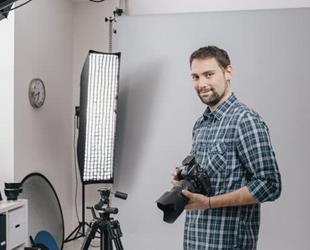How to become a Certified Professional Photographer

Becoming a Certified Professional Photographer (CPP) can provide a tremendous boost to your professional photography business. It can improve your photography skills, lets potential clients know you’re fully qualified, and can help you be a successful photographer.
However, there are a few things that ambitious photographers should know before they pursue a CPP for themselves.
What is a Certified Professional Photographer?
The Certified Professional Photographer program is operated by Professional Photographers of America (PPA), a nonprofit with more than 34,000 members. The PPA’s mission is to help photographers grow their business and income through educational resources, the opportunity to network with other professionals, and various degrees and certifications.
Professional digital photography means more than just switching from a cell phone to a digital single-lens reflex camera or learning to use photography programs, such as Adobe Photoshop and Lightroom.
A Certified Professional Photographer designation is something like a master class, with photography courses dealing with the fundamentals of photography, photography equipment, photography programs, and having your best work examined by professionals.
How do I get a professional photographer certification?
In order to acquire a professional photographer certification, you will need to take the following steps:
Become a PPA member
To enroll in the Certified Professional Photographer program, you must register to become a PPA member, which can cost between $16 and $33 per month, depending on the level of benefits you choose. Student memberships cost $79 per year and are available to any student enrolled in a two or four-year college or university.
Apply for the Certified Professional Photographer program
After joining, you declare your candidacy for the CPP course, submit an application, and pay a $200 fee, which gives you a two-year window to complete the program. (There’s an additional $25 fee to take the course online.)
Take the CPP exam
The next step is to pass the Certified Professional Photographer exam, which the PPA offers online and at testing centers across the U.S. The exam covers various aspects of photography and includes questions about light, exposure, shutter-speed composition, and equipment. The PPA’s website provides exam-preparation resources such as sample exams, tutorials, and flashcards.
Submit a portfolio
After passing the test, you submit three images to the PPA for a technical evaluation. If the organization doesn’t approve your first portfolio, you can resubmit images as often as you like until your two-year window expires. For more information about this process, check out the PPA’s image evaluation overview.
Maintain your certification
Once your portfolio has been approved, the PPA will then recognize you as a Certified Professional Photographer.
After receiving certification, you’ll need to recertify every three years. This requires 15 continuing education units, or another exam. The recertification fee is $100, but this is waived for members who attend the Imaging USA trade conference three years in a row, or are a CPP Elite or Elite Plus member.
What are the benefits of becoming a Certified Professional Photographer?
Becoming a Certified Professional Photographer can set you apart from the competition, acquire new clients, and boost your photography career.
The career paths to a successful photography business typically require photography classes, an associate degree or bachelor’s degree, skills with photo editing software, and hands-on commercial photography experience; such as a photojournalist or full-time wedding photographer.
A CPP helps indicate that you have the skill set to maintain the highest standards of your profession. It means people can trust you regardless of the type of photography you offer or your specialization in the field, such as portrait photography, wedding photography, photojournalism, product photography, or real estate.
A blog post published by the PPA organization cites additional career benefits of completing the Certified Professional Photographer program, such as consistent results, technical prowess, artistry, and professionalism.
Your CPP certification is also something you can put on your website, business cards, social media promotions, and your photography portfolio page.
Before you spend the time and money to earn your certification, you might want to see how many competing photographers in your area have this credential. The PPA’s Find a Photographer website allows you to search a database of photographers by location and specialty and includes a filter that surfaces only Certified Professional Photographers.
How to become a Certified Drone Photographer
The PPA’s drone photographer certification program is another way to set yourself apart in a competitive and growing field. It demonstrates that you have the skills and knowledge to deliver quality work in a safe and legal manner.
To qualify for drone photographer certification, the PPA requires its members to have:
- FAA Section 44807 (previously 333) Certificate OR a Remote Pilot Certificate (Part 107)
- Proof of general liability insurance
- An Unmanned Aircraft System (UAS) Registration Number from the FAA
- A logbook summarizing 30 hours of Flight Time
An application costs $75 and gives you one year to take the exam, upon approval. The online exam costs $17.50.
The exam consists of 60 multiple choice questions. Certification is good for two years and you can recertify by uploading your new FAA test score, or your updated remote pilot certificate.
Insure your photography business
Being self-employed with your own business is about more than just capturing images, you’ll also need to protect your photography business with the right kinds of insurance.
Commercial property insurance
Even if you operate your photography studio out of your home, you will still likely want to purchase commercial property insurance to protect your equipment, as many homeowner’s insurance policies do not cover replacing stolen or damaged professional gear—and replacing a digital camera, lighting equipment, etc. can be expensive.
Inland marine insurance
Inland marine insurance, a type of commercial property insurance, covers your photography equipment while it’s in transit or being stored somewhere other than your home or business.
General liability insurance
General liability insurance can protect your photography business from personal injuries to clients and property damage. If you decide to rent a studio, most landlords require you to carry this policy in order to sign a commercial lease.
Professional liability insurance
Professional liability insurance covers expenses caused by missed deadlines and work mistakes, including legal costs and fines.
Commercial auto insurance
If you frequently drive to photo shoots in business-owned vehicle, you will need commercial auto insurance. It’s required in almost every state, and since your personal auto insurance might not cover damages sustained in an accident while driving for work, it makes sure you are covered no matter the travel situation.
Workers' compensation insurance
Workers’ compensation insurance provides protection against work-related injuries and illnesses. Most states require you to purchase workers’ compensation insurance as soon as you hire your first employee.
Drone photography insurance
For professional drone photographers, the right drone photography insurance could be crucial if someone claims your drone infringed on their privacy, damaged their property, or caused a bodily injury. Drone insurance can help pay for your legal expenses, settlement costs, and the repair or replacement of your unmanned aerial vehicle (UAV).
It’s worth noting that some insurance industry experts believe that becoming a Certified Professional Photographer can help your business reduce its professional liability risk. Since you have access to the PPA’s educational resources and will take continuing classes or another exam to recertify, this can give you a better understanding of your own professional liabilities.
Get photography business insurance quotes from trusted carriers with Insureon
Complete Insureon’s easy online application today to compare insurance quotes from top-rated U.S. carriers and protect your business. Once you find the right policies for your photography business needs, you can begin coverage in less than 24 hours.

